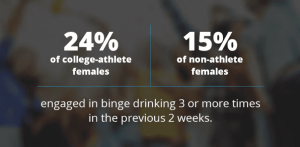Alcohol use and sports activity do not necessarily correlate. Alcohol affects sports players no differently than anyone else. In this chapter, we will look carefully at what alcohol does to an athlete and athletic performance.

![meritain-health-logo-vector[3]](https://www.tranquilshores.org/wp-content/uploads/2022/10/meritain-health-logo-vector3.png)

![blue-cross-blue-shield-1-logo-png-transparent[2]](https://www.tranquilshores.org/wp-content/uploads/2022/10/blue-cross-blue-shield-1-logo-png-transparent2.png)






Chapter 1: The Effects Of Alcohol On Sport Performance
Alcohol and athletes seem to be culturally tied together. Around the world, alcoholic beverage companies sponsor sports teams and advertise their products throughout the game. Baseball players celebrate a win by spraying champagne all over the locker room. Super Bowl parties commonly feature a well-stocked beer supply. Alcohol is often associated with manliness, prestige and conquering the opposition.
However, it is not only male athletes who consider alcohol a tradition. According to a report published in 2008, 24 percent of college-athlete women had engaged in binge drinking three or more times in the previous two weeks compared to 15 percent of female non-athletes. Male or female athletes might drink alcohol for a range of reasons, including:
- To celebrate a win
- To cope with the pressure
- In response to social pressure to drink
- To relax after a game
- To relieve anxiety pre-game
- To deal with feelings of failure
Drinking alcohol also affects young athletes. For example, a study published in 2011 reported about 45 percent of non-exercising high school students said they drank alcohol in the past month, while 57 percent of students on sports teams drank in the past month. In both colleges and high schools, student-athlete alcohol abuse is far too common.
How Alcohol Affects Athletic Performance
When an athlete is under the influence of alcohol, they may feel invincible and in control of any pre-game jitters. However, there is no real reward for alcohol abuse. As you will see, drinking has a negative effect on performance during and after a game.
1. Drinking Before Exercise
Drinking before a game may temporarily relieve anxiety, but that is only because drinking alcohol depresses the central nervous system (CNS). Depressing the CNS can lead to:
- Decreased coordination
- Impaired balance
- Weakened motor skills
- Impaired judgment
- Delayed reaction
Alcohol also decreases endurance. A study which observed 13 male endurance-trained cyclists found that even a small amount of alcohol reduced endurance.
Alcohol is mostly absorbed by the body as ethanol and has several effects on metabolic function. For example, it inhibits gluconeogenesis which is the process of producing sugars needed for energy. Alcohol also speeds up heart rate during exercise because of cardiovascular strain. These factors contribute to reduced endurance.
Alcohol consumption before exercise does not only have a negative impact on performance and endurance, but it also increases the risk of a sports injury. Drinkers have an injury incidence of 54.8 percent compared to 23.5 percent in non-drinkers.
2. Drinking After Exercise
After a game or practice, an athlete might be tempted to unwind with teammates and have a few drinks. If they do, they will not reap the maximum benefits of their hard work. Drinking alcohol after exercise slows the recovery process and muscle growth by interfering with glycogen replenishment, muscle protein synthesis and restoring fluid balance.
The body uses carbohydrates from food, breaks it down and converts it into glucose. Glucose plays an important role in giving us energy. Glucose that is not used is stored in the liver and muscles and is called glycogen. When the body needs to tap into its natural energy supply, glycogen is broken down and released as glucose into the blood.
Alcohol interferes with this process. The liver works hard to remove alcohol from the blood and puts glucose management to the side.
Also, drinking alcohol 24 to 48 hours after a workout inhibits muscle protein synthesis. Alcohol decreases the release of muscle-building hormones such as testosterone. This can hinder muscle growth and recovery, and an athlete will not be ready to perform again as quickly as someone who does not drink.
3. Hangovers Reduce Performance
After a day of drinking, an athlete is not going to feel in their best shape. Men only need to consume five drinks over four to six hours, and women as little as three, to experience a hangover.
Hangover symptoms include an electrolyte imbalance, stomach irritation, feeling drained and many other physical symptoms that reduce performance. There are no cures for a hangover and symptoms can only go away on their own. If an athlete has practice or a game after a drinking binge, they will lose a competitive edge.
Drinking Alcohol While Injured From Sports
If an athlete suffers an injury, they might feel compelled to numb their pain with alcohol. Since ancient times, people have used alcohol as a painkiller. In fact, 28 percent of people who suffer from chronic pain turn to alcohol.
Unfortunately, alcohol only works as a pain-reliever when it’s taken in amounts that exceed the recommended daily intake. In the end, it causes more harm than good and could lead to addiction. Here are the main reasons why alcohol is not a healthy solution for a sports injury or any injury at all.
1. Slows Recovery Time
Alcohol slows recovery from an injury because it limits inflammatory response by decreasing anti-inflammatory molecules and increasing pro-inflammatory molecules. Chronic alcohol use leads to chronic inflammation and ultimately organ damage. Alcohol also affects the hormones needed for muscle growth and repair.
If an athlete suffers a concussion, for example, they want to avoid alcohol at all costs. The brain needs at least one to two years to recover from a traumatic brain injury (TBI), and alcohol slows down or completely stops the recovery. It also puts TBI survivors at risk for developing epilepsy or having a second brain injury.
2. Negatively Affects Sleep
Sleep is critical to help athletes heal physically and mentally from an injury. For instance, sleep is needed for healthy bone marrow which eventually creates new blood cells in the body to help repair any damage.
Inadequate sleep also affects liver functioning and makes it less efficient at detoxifying the body and managing glucose levels — not a good combination with alcohol. Alcohol decreases sleep quality and disrupts sleep cycles throughout the night.
3. Worsens Depression
An injured athlete may feel isolated and depressed. Alcohol is a depressant and makes symptoms of depression worse. It also makes antidepressants less effective and could lead to poor life choices. An athlete needs a positive mindset and a healthy diet to help speed up recovery. Alcohol only brings users down.
Famous Athletes With Drinking Problems
Struggling with alcohol abuse is nothing new in the world of sports. Many famous sports players had substance use disorders, and many pushed their addiction too far. If they had gotten the help they needed, some of them might still be here today. You will likely recognize some of these names, and maybe a few will surprise you:
- Brett Favre: Favre is a former football star who struggled with painkiller and alcohol addiction and issues from a concussion. Favre retired at age 46.
- Mickey Mantle: Mantle entered rehab once the doctor told him his liver looked like a “doorstop.” His son, also a heavy drinker, died of liver cancer.
- James Hunt: British racing driver James Hunt was widely known as an alcoholic. He died from a heart attack at age 45.
- Babe Ruth: Baseball legend Babe Ruth struggled with alcoholism and died at 53 from cancer.
- Miguel Cabrera: Baseball pro Cabrera went to rehab and claimed he could not conquer the disease.
- George Best: The Northern Irish professional footballer who spent three months in jail for drunk driving. Best died at age 59 and had severe liver damage.
- Andre the Giant: Known to consume large amounts of alcohol in one sitting, Andre the Giant died at 46 from heart failure.
- Lawrence Taylor: Taylor was an alcoholic for most of his time as a New York Giants linebacker.
The Effects of Alcohol on the Body
Alcohol use should not be taken lightly whether you are an athlete or not. However, athletes need to be especially cautious of what they put in their body if they want to perform at their best. Alcohol abuse makes an impact in the following ways:
- Causes Weight Gain: Alcohol has a lot of calories and sabotages efforts to maintain a specific weight. Alcohol consumption also encourages unhealthy diet choices.
- Leads to Nutritional Deficiencies: Your body needs nutrients to function properly. Alcohol depletes nutrients, and heavy drinking can lead to nutritional deficiencies, affecting performance overall.
- Increases Disease Risk: Long-term alcohol abuse increases the risk of cancer, heart disease, liver disease and weakens the immune system.
- Increases Fatality Risk: In 2015, of 78,529 liver disease deaths in the country, 49.5 percent involved alcohol. An estimated 88,000 people die annually from alcohol-related causes in the United States.
- Has a Negative Impact Overall: Alcohol consumption might also cause issues with school, finances and relationships.
Fortunately, you can get treatment for alcohol addiction. Reach out to us at Tranquil Shores, and we will help you regain control of your health and your life.






